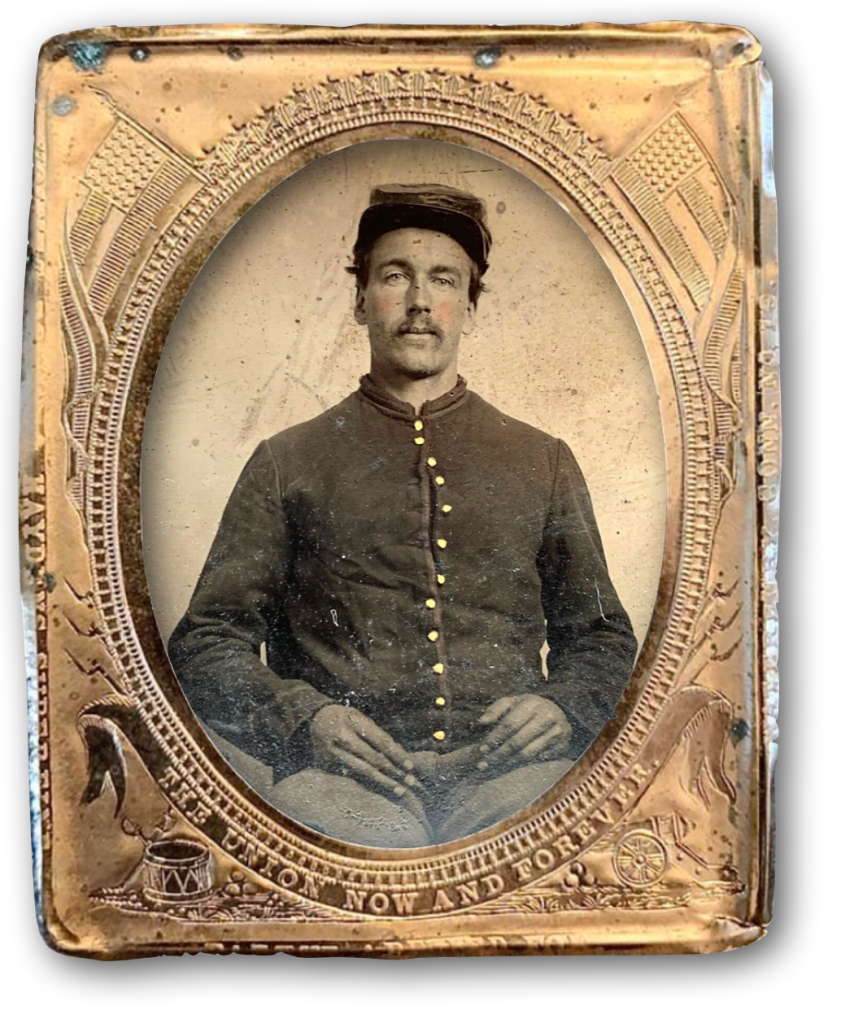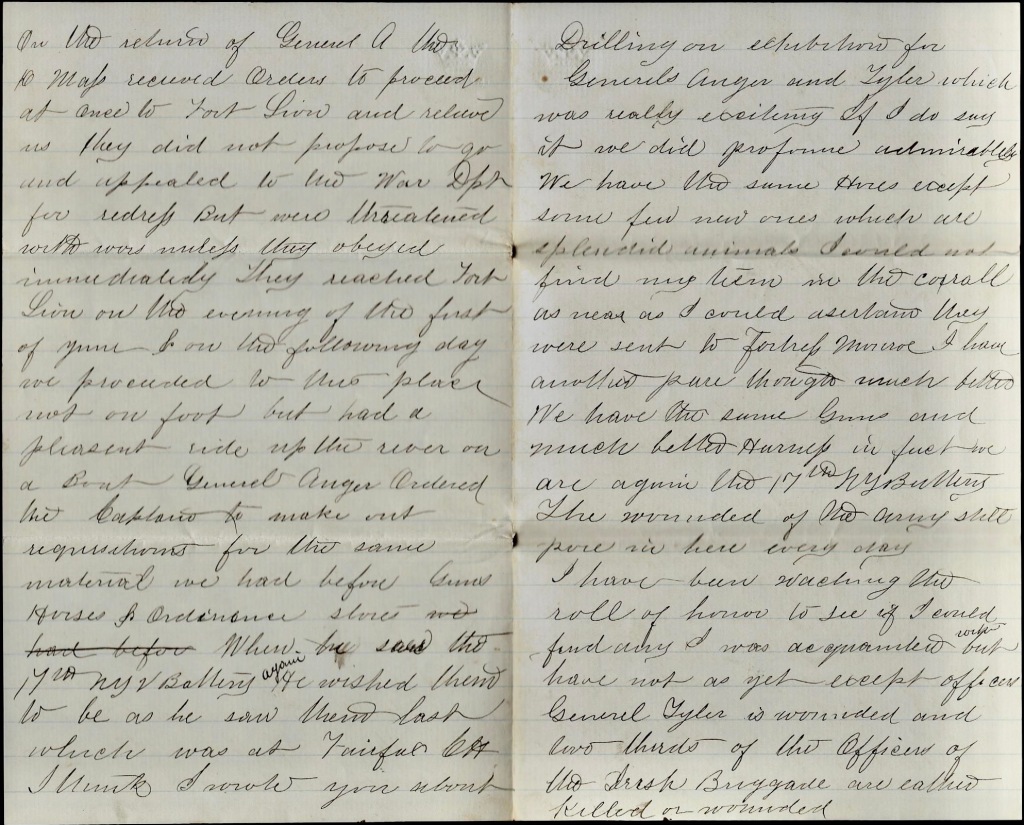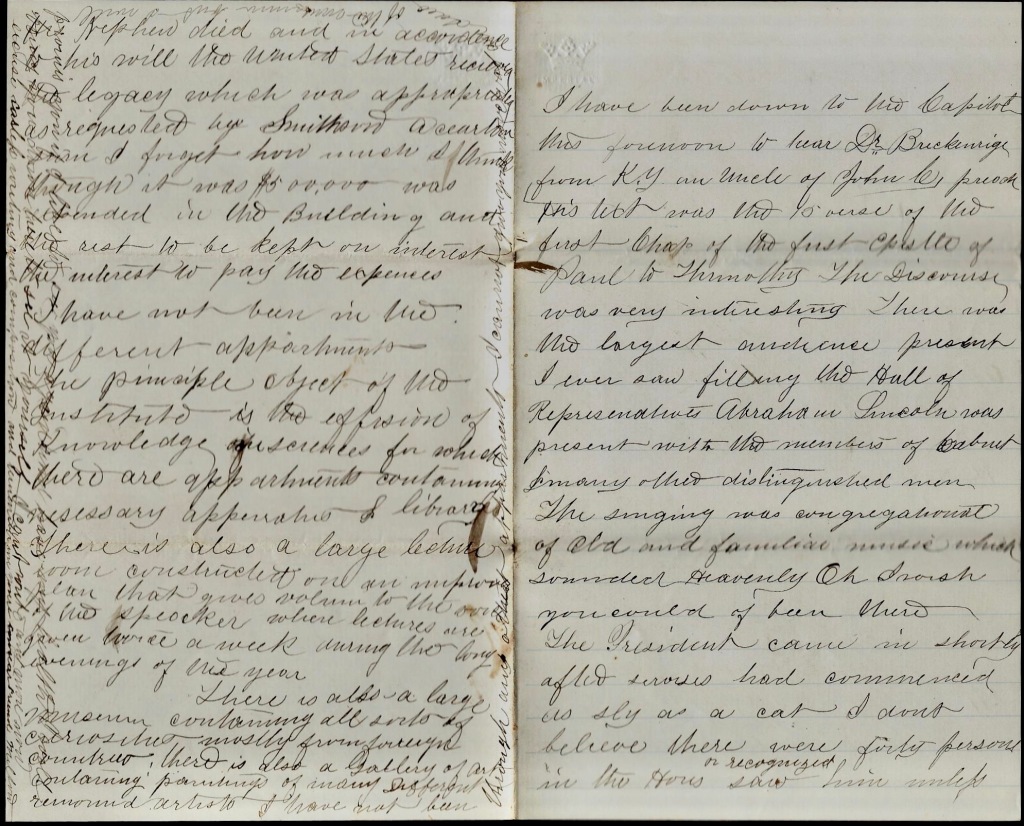
This incredible letter, never before published, was written by J. Milton Whipple (1842-1870) of East Shelby, Orleans County, New York, who enlisted on 21 August 1862 in the 17th New York Light Battery for three years. He mustered out with the battery on 12 June 1865 in Richmond, Virginia.
Milton was the son of Griffin Whipple (1797-1874) and Louisa Barber (1816-1847) of Gallopsville, Schoharie County, New York.
After returning from the war, Milton married Electa Bertha Sherwood (1842-1903) but he died in June 1870. After Milton’s death, Electa married Ephraim W. Masten (1840-1880).
The letter includes an excellent description of President Abraham Lincoln, of the Smithsonian Institution, and of the Overland Campaign casualties. The envelope shown here with this letter is postmarked Washington, July 1863 but it is not the envelope that carried this letter.
[See also—1863: J. Milton Whipple to Electa Bertha Masten]
Transcription

Camp Barry
Washington D. C.
Sabbath afternoon, June 12th 1864
My dear friend,
I received yours of Sunday last in due season which I assure you was read with much interest. You see we are again back to Camp Barry which is through the kindness of our old friend General Auger. At the time we are dismounted. He was down to Fredericksburg, his Department having been extended as far as the Rappahannock. During his absence, Brig. General [Albion P.] Howe, Inspector of Artillery, was mean enough to dismount us and leave some of his New England Batteries here who were raw troops & had been drilled but little—particularly the 16th Massachusetts.
On the return of General Auger, the 16th Massachusetts received orders to proceed at once to Fort Lyon and relieve us. They did not propose to go and appealed to the War Department for redress but were threatened with worse unless they obeyed immediately. They reached Fort Lyon on the evening of the first of June & on the following day we proceeded to the place, not on foot, but had a pleasant ride up the river on a boat. General Auger ordered the Captain to make out requisitions for the same material we had before—guns, horses, & ordnance stores. When he saw the 17th New York Vol. Battery again, he wished them to be as he saw them last, which was at Fairfax Court House. I think I wrote you about drilling on exhibition for General Auger and Tyler which was really exciting, if I do say it [myself]. We did perform admirably.
We have the same horses except some few new ones which are splendid animals. I could not find my team in the corral. As near as I could ascertain, they were sent to Fortress Monroe. I have another pair though, much better. We have the same guns and much better harness. In fact, we are again the 17th New York Battery.
The wounded of the army still pour in here every day. I have been watching the roll of honor to see if I could find any I was acquainted with but have not as yet except General [Robert Ogden] Tyler is wounded and two-thirds of the officers of the Irish Brigade are either killed or wounded. Captain Star has been in the Lincoln hospitals nearby us. I don’t know but he is there yet. Quite a number of the 8th were at the Emory Hospitals but I understand they were sent to Philadelphia and New York. Yesterday one man in this company by the name of Moore has lost a son in that regiment. There are also five other men that have brothers in that regiment they have not heard from.
We have heard but little news from the army for the past week. Many in Washington would have Grant defeated but I am confident of final success.
I am glad to hear that Pa’s finger has got well. It has bothered my brains considerable.

I have not heard any news from the 2nd Mounted Rifles since we left Fairfax. I expected they would get into trouble by what we head at that time. It’s really too bad though that they have been so unfortunate. The officers are more to blame than the men.
I have been down to the Capitol this forenoon to hear Dr. [Robert Jefferson] Breckinridge from Kentucky—an uncle of John C. preach. His text was the 15th verse of the first chapter of the First Epistle of Paul to Timothy. The discourse was very interesting. There was the largest audience present I ever saw filling the Hall of Representatives. Abraham Lincoln was present with the members of cabinet & many other distinguished men. The singing was congregationalist of old and familiar music which sounded heavenly. Oh! I wish you could of been there.
“The President came in shortly after services had commenced as sly as a cat…After services he arose from his seat and assumed his characteristic Indian gait and left the crowd as soon as possible, shaking hands with a few lady acquaintances as he came in contact with them.”
The President came in shortly after services had commenced as sly as a cat. I don’t believe there were forty persons in the House saw or recognized him unless they were acquainted with him and their eyes directly upon him when he entered the door. He was dressed very common—not as cleanly as the general average of common folks. I saw him at the White House yesterday. He had just got out of his carriage all covered with dust & sweat. Today he had on the same suit. After services he arose from his seat and assumed his characteristic Indian gait and left the crowd as soon as possible, shaking hands with a few lady acquaintances as he came in contact with them.
You ask me to give you a description of the Smithsonian Institute, it’s object &c. It is a very fine building situated in a field of about twenty acres on or near the bank of the river, about the center of the city on a line drawn east and west. It is built of freestone and has the appearance of a castle or of some building of ancient architecture. It was originated by John Smithson of London who had given his whole life to the study of science which was his ambition seeming to increase until the day of his death. During his life he had accumulated an immense fortune which he was about to bequeath to the London Royal Society but on account of some misunderstanding, he abandoned that idea. He left it with his nephew and in case of his death it was to fall to the Government of the United States for the purpose of founding the above Institution. The nephew died and in accordance to his will, the United States received the legacy which was appropriately as requested by Smithson. A certain sum—I forget how much, I think though it was $500,000—was expended in the building and the rest to be kept on interest, the interest to pay the expenses. I have not been in the different apartments. The principle object of the Institute is the effusion of knowledge in sciences for which there are apartments containing necessary apparatus & libraries. There is also a large lecture room constructed on an improved plan that gives volume to the voice of the speaker when lectures are given twice a week during the long evenings of the year.

There is also a large museum containing all sorts of curiosities mostly from foreign countries. There is also a gallery of art containing paintings of any different renowned artists. I have not been through any of the apartments [so] I cannot give you much idea of the museum but I will promise you if I live to see you again and have my health, I will bring you down here to see it yourself. I can’t write anymore now.
Excuse careless writing and composition and remember me, your constant friend—Milton
Please electioneer all you can for Lincoln & Johnson. He is indeed the greatest man the country has known since the days of Washington. My love to all.





I believe the ENVELOPE is wrong, and this letter was indeed written on Sunday June 12, 1864. Lincoln and Johnson weren’t “an item” until 1864.
Tom Taber – the “Orleans Battery” and “Hard Breathing Days”
LikeLike
Tom, you are correct. Good catch. I have edited the posted transcript.
LikeLike